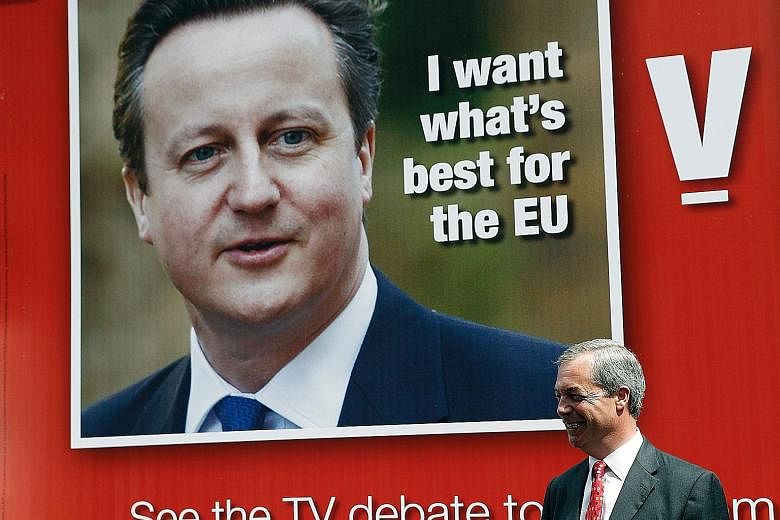With just under two weeks to go before Britain's referendum on whether it should remain in the European Union, Prime Minister David Cameron has intensified his attacks on anti-EU campaigners, accusing them of "telling complete untruths to the British people".
But the increasingly bitter and personal attacks by opponents and supporters of the EU have failed to shift British public opinion, with polls indicating that the result of the referendum is now too close to call. And the ugly mood between politicians in London may spell a longer-term period of political turmoil, regardless of who wins on June 23.
Mr Cameron rejects speculation that his decision to take personal charge of the campaign is due to "panic" at the tightening polls. Still, there is little doubt that the government's pro-EU camp is worried about current polling trends.
Mr Cameron's initial strategy was to discredit the Brexiters - as those advocating Britain's exit from the EU are known - by pointing out that they had no credible plan for how to protect the British economy outside the EU. The Brexiters' relative lack of government experience and their poorly thought-out alternatives worked to his advantage.
However, Brexiters have managed to turn the tables on him by concentrating instead on immigration, which they claim has become "uncontrollable" as a result of Britain's EU membership.

Official statistics say otherwise, indicating that a majority of migrants originate from outside the EU. Still, Mr Cameron is vulnerable on this issue, partly because he has promised to reduce overall immigration to 100,000 a year, only to see it rise to 362,000 last year, and partly because of widespread assumption among the electorate that Britain is powerless to control its borders.
"Inside the European Union we cannot stop bad people from coming into our country if they have EU passports," claimed Mr Nigel Farage, the leader of the far-right UK Independence Party (UKIP), who has taken to waving his British passport at rallies.
Although Mr Cameron refuses to confront Mr Farage directly in a televised debate, he agreed this week to be quizzed by a TV audience just after the UKIP leader made a similar studio appearance.
But the outcome was merely a draw, with Mr Cameron performing well but Mr Farage still attracting applause with a vow that Britain "won't be bullied" by Europe.
Supporters of Britain's EU membership have succeeded in landing a blow on Mr Farage by releasing this week an attack video featuring a collection of his offensive comments, including one in which he justified the use of the word "Chinky", an abusive racist term for people of Chinese origin, by one of his associates.
But the danger is that the more Mr Farage becomes the topic of attention, the more this allows opponents of the EU to frame the entire debate as one about immigration, precisely the topic on which the anti-EU camp enjoys a decisive electoral advantage.
And Mr Cameron's decision to jump into the debate is not without its risks either, for it opens deep rifts within his ruling Conservative party which may take years to heal.
Mr Cameron has already been challenged by two prominent Brexiters in his party - former London mayor Boris Johnson and Justice Secretary Michael Gove - to a televised confrontation.
Mr Cameron is unlikely to accept the challenge, but he must move the debate away from immigration, and must do so soon, for although all opinion polls indicate the number of undecided voters is shrinking, the outcome of the June 23 referendum hangs in the balance, with roughly 42 per cent of the electorate intending to opt to leave the EU, and a similar portion wishing to stay.
The Prime Minister's hopes are buoyed by some pollsters' evidence that the turnout will be high on June 23; the higher it is, the better the chances for EU supporters, since most of those likely to opt for Britain to stay are younger voters who usually do not bother to vote.
But Mr Cameron also knows that even if he prevails in this confrontation, the anti-EU troublemakers within his party won't be silenced; it's not only Europe but also the Prime Minister himself who is now in their firing line.

